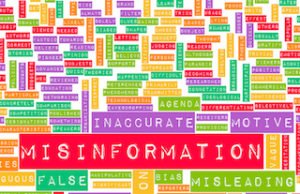At the National Ethics Association, we often discuss the actions financial advisors should take to become more transparent with their clients. These fall into four main categories:
- Building and maintaining a content-rich web site.
- Complying with regulator-mandated disclosures.
- Ordering a comprehensive personal background check.
- Disclosing key facts about their business during sales interviews and seminars.
All these steps are well and good. But the most powerful tactic of all is straight talk. These are discussions you have face-to-face with your clients. They can also transpire electronically via your web site or newsletter. Being up front pays big dividends in terms of accelerated trust building, fewer objections during the sales process, and more persistent insurance policies and investment accounts.
Straight talk is especially important during the initial stages of the customer relationship. At this point, doubt is at its highest. So a little bit of candor will go a long way toward breaking it down. Discussing your professional education and credentials is a great topic at this stage; since there’s so much confusion about “alphabet soup” designations your clients will welcome your guidance.
Christopher Grande, MSIM, RMA, a registered investment advisor out of Medford , Massachussetts, illustrates this point. Grande’s firm, Walnut Hill Advisors, LLC, publishes a blog on which he shares his thoughts about personal finance, retirement planning, and, well, life. And he also talks candidly about what he does as an advisor and why.
Regarding designations, Grande is totally frank. “Most of these ancillary designations are more professional ‘interests’ in my opinion than a ‘certification,’” he writes. “For example, my ‘RMA’ credential stands for Retirement Management Analyst. And even though I studied a curriculum and took an exam, this credential reflects more my interest in the area of retirement income planning and my desire to be open and creative about the process than anything else (again my opinion).
“My “MSIM” credential on the other hand, reflects the extremely focused, and intense 17 month Masters degree I earned in Investment Management from BU and my intense interest and dedication to investment analysis. Other credentials such as CFP, CFA, CPA —all require longer and more intense study periods too and a difficult exam. But these convey book knowledge.
“RMA is more like a specialty,” he adds. “I want to help people develop secure retirement incomes so I pursued this credential and am a member of the issuing organization—RIIA (the Retirement Income Industry Association)—which is an association of financial professionals, financial companies, financial-product developers, academics, journalists, and researchers in the field of retirement income planning. It is an awesome collection of intellectual and practical talent.
“I don’t know what the Retirement Income Certified Professional (RICP) designation, offered by the American College, is going to do for professionals. But I know in my situation that the RMA credential alone would not make me an expert in income planning. And that’s what consumers need to know. It shows an area of interest, and a general level of education beyond basic financial planning in this area (retirement income). But it is really the dedication of the practitioner that makes the RMA education useful to the planner AND to the client.
“ In summary,” he writes, “know that some credentials reflect an intense course in all of the basics, some a short but focused study of a particular area, and some reflect an interest in a certain type of clientele. And know that some courses and exams are easy and some are very difficult. But what really matters is competence, interest, and pursuit of continual knowledge beyond the credential, in the area(s) you need planning in.”
Here’s what we like about Grande’s candid discussion about professional designations:
- He avoids positioning designations as talismans that automatically confer mastery of a product or planning discipline. In his view, they are symbols of an advisor’s commitment to a given field and recognition of additional study beyond entry level.
- He admits that not all professional designations (or degrees) carry the same weight. Some require an immense amount of study and some not so much. He does his customers a service by explaining which of his credentials are “heavy duty” and which are not.
- Finally, he explains that what really matters ultimately is professional competence, which advisors must acquire through initial training, practical experience, and continuing education.
So let’s be fully transparent about our topic here. Grande’s straight talk about his designations is refreshing, and we’re sure his prospects—and clients—welcome his honesty. What do you think? Do you talk straight with your clients about your designations, your professional practices, and your business overall? If not, try it. We think your clients will appreciate your candor—and reward you for it with their trust and loyalty.
For more information about ethical sales practices, please visit the National Ethics Association’s Ethics Center atethics.net. For information on affordable errors-and-omissions insurance for low-risk financial advisors, please visitEOforLess.com.












